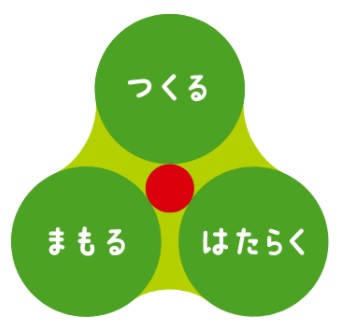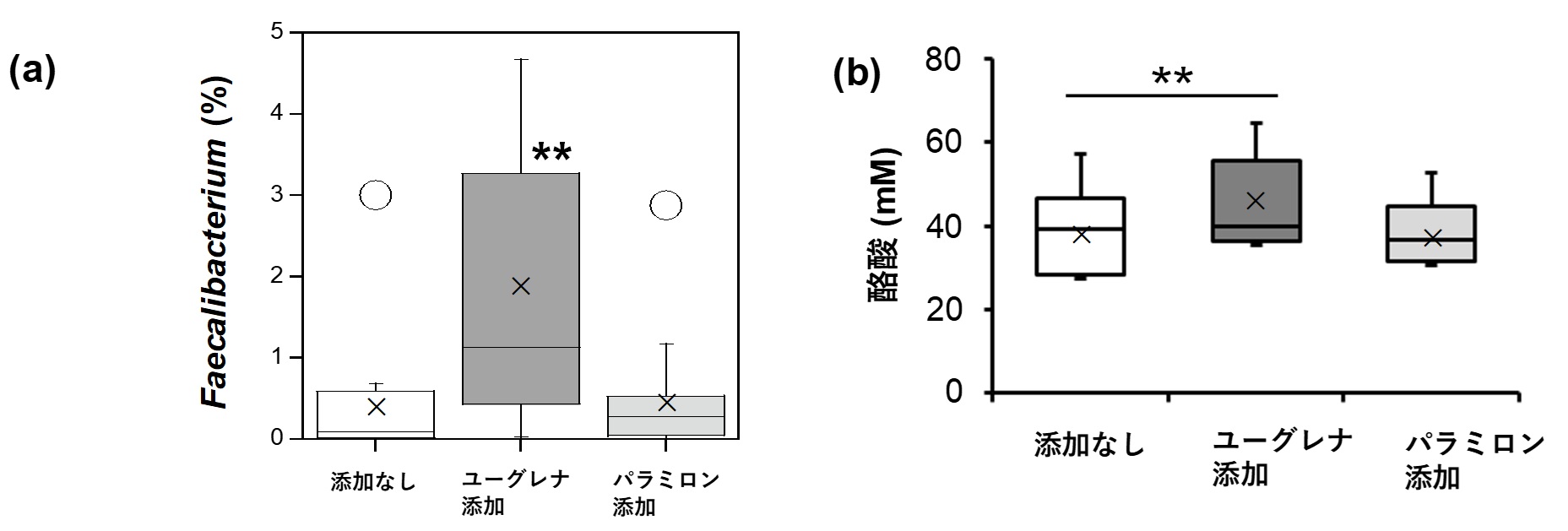Press Releases
Euglena, a microalgae, is attracting attention for its potential to regulate immune balance, etc.
It was confirmed that it contributes to the increase in the occupancy rate of intestinal bacteria that produce butyric acid (Rakusan) and the increase in butyric acid production.
Possibility to improve from the intestinal environment and support a healthy body from the ground up
Euglena Co., Ltd.
National University Corporation Kobe University
Euglena Co., Ltd. (Headquarters: Minato-ku, Tokyo, President: Mitsuru Izumo, hereinafter "Euglena") and Kobe University Graduate School of Science, Technology and Innovation (Visiting Associate Professor Kengo Sasaki) It is noted that the microalgae Euglena (Japanese name: Euglena, hereinafter "Euglena") may contribute to the regulation of immune balance and the improvement of symptoms of type 2 diabetes. ) Producing intestinal bacteria (hereinafter referred to as "butyric acid bacteria") * 1”), The intestinal bacterial flora * 2 We are pleased to inform you that we have confirmed the research results that suggest an increase in the occupancy rate of butyrate-producing bacteria and an increase in butyric acid production in Japan. The results of this research were published in the online academic journal "Scientific Reports" published by Nature Research on January 13, 2021 local (UK) time (). https://www.nature.com/articles/s41598-020-80306-0).
* 1 A bacterium that produces butyric acid in the intestine. It is also said to be a longevity bacterium possessed by people with longevity.
* 2 A wide variety of bacteria inhabit the human intestine, and the group of bacteria is called the intestinal flora or intestinal flora.
■ Purpose of research
In the human intestine, more than 100 types of intestinal bacteria inhabit more than 100 trillion, and the population of intestinal bacteria is called the intestinal flora. In recent years, it has become clear that intestinal bacteria form an intestinal flora while maintaining mutual balance in the intestine, and that balance is related to human health. When the intestinal flora is out of balance due to illness, aging, mental and physical stress, changes in the environment, changes in eating habits, etc., specific bacteria are found in the intestinal flora where diversity is important. It is said that the increase in toxic substances also increases harmful substances, leading to various disorders. Lactic acid bacteria and bifidobacteria are known as bacteria that have a positive effect on the body in such an intestinal flora, but in recent years, the importance of butyrate-producing bacteria has also attracted attention. Among them, Faecalibacterium prausnitzii (hereinafter referred to as "Faecalibacterium") is known as one of the most abundant butyrate-producing bacteria in the digestive tract. Butyric acid produced in the intestine by butyrate-producing bacteria has been shown to contribute to the regulation of immune balance and the improvement of symptoms of type 2 diabetes by improving insulin resistance. It is also being studied that it may be more abundant in the intestines of people with longevity. Euglena believes that it is important to achieve sustainable health by maintaining the foundation of health and improving it to a better state. Euglena, and breaking the chain of "malnutrition," "mental and physical fatigue," and "immunity weakness," which are multiple factors that hinder the foundation of health. We are conducting research on the possibility of achieving sustainable health, but it is known that the imbalance of the intestinal flora also affects the decrease in nutrient absorption and immunity. In this study, Euglena intake affects the human intestinal flora.
Euglena, and breaking the chain of "malnutrition," "mental and physical fatigue," and "immunity weakness," which are multiple factors that hinder the foundation of health. We are conducting research on the possibility of achieving sustainable health, but it is known that the imbalance of the intestinal flora also affects the decrease in nutrient absorption and immunity. In this study, Euglena intake affects the human intestinal flora.
■ Research content and results
In this study, the effect of Euglena on the human intestinal flora and its metabolite production is evaluated using a model that reproduces the human large intestine environment in vitro (hereinafter referred to as the "in vitro model"). We examined the changes in the intestinal flora when 28 men and women took Euglena continuously for 30 days.
Euglena confirmed in vitro model to increase euglena occupancy and increase butyric acid production
Euglena was added to each stool sample obtained from 11 healthy subjects and fermented in vitro. Analysis of the gut microbiota revealed that Euglena significantly increased the occupancy of Phycaribacterium (Fig. A). We also examined the metabolites produced by the fermentation, Euglena when fermented by adding, Euglena as compared with the case of fermented without the addition of production of butyric acid were shown to increase (Fig. B). The increase in fecaribacterium and the production of butyric acid were not observed with the addition of paramylon, suggesting that the contribution of components other than paramylon Euglena

Figure Occupancy of Phycaribacterium in in vitro model (a) and butyric acid concentration (b)
Wilcoxon signed rank test, ** p <0.01
Euglena increased the occupancy of butyric acid-producing bacterium Phycaribacterium in the intestinal flora.
Twenty-eight men and women analyzed the intestinal flora before and after ingesting Euglena As a result, the occupancy rate of Phycaribacterium increased significantly. This indicates that the increased occupancy of human bacterium observed in the in vitro model may be reproduced in the human large intestine environment even with continuous ingestion in humans.
From the above results, it was shown Euglena may function as a prebiotic * 3 and regulate the balance of the intestinal flora, and that the effect may be caused by the contribution of components other than paramylon Euglena.. Euglena Co., Ltd., in these days when various health concerns are occurring, further elucidation of the potential of Euglena that supports the cycle of "making, working, and protecting" that the body originally has, and in the field of health foods and medical fields of Euglena We will carry out research and development with the aim of utilizing euglena and increasing added value as foodstuffs.
* 3 A food ingredient that serves as a nutrient source for intestinal bacteria and promotes the growth of intestinal bacteria.
<About Euglena (Japanese name: Euglena)>
Ishigakijima Euglena is a type of algae similar to wakame seaweed, kelp, and chlorella. It has the characteristics of both animals and plants, and has a well-balanced balance of 59 types of nutrients such as vitamins, minerals, amino acids, and unsaturated fatty acids. Includes. Paramylon, which is a component unique to Euglena and is a type of β-glucan, has been studied for its functionality in recent years and is expected to be used in the healthcare field such as foods and cosmetics.
-Contact for inquiries from the press-
Euglena Co., Ltd. Corporate Communication Division
Public Relations Section, General Affairs Department, Kobe University
